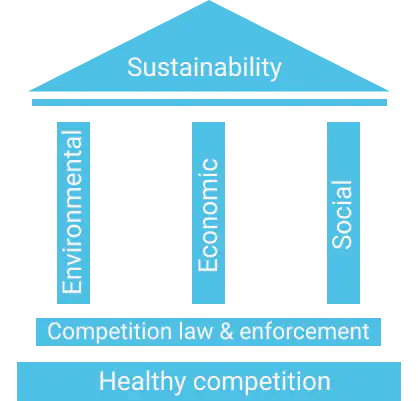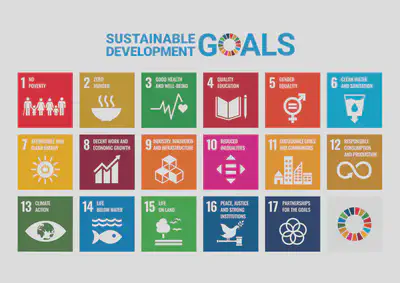Healthy Competition is a Prerequisite for Achieving Sustainable Development Goals
 Competition law, as a founding stone holds the three pillars of sustainability
Competition law, as a founding stone holds the three pillars of sustainability
The 2030 Agenda for Sustainable Development was adopted by all United Nations Member States in 2015. At its heart are the 17 Sustainable Development Goals (SDGs), which are an urgent call for action by all countries — developed and developing — in a global partnership. The SDGs recognize that ending poverty and other deprivations must go hand-in-hand with strategies that improve health and education, reduce inequality, and spur economic growth while tackling climate change and working to preserve our oceans and forests.
The Competition Data Observatory aims to foster fair competition, market efficiency, and ultimately global and consumers’ welfare by providing hard-to-get data and data science expertise to support competition law enforcement and compliance. We would like to enable impact makers (i.e. companies, competition authorities, regulators, academic researchers, etc.) to contribute to the SDG goals by making AI and big data work for them and ensure access to public information for organizations who cannot employ data engineers and data scientists.
Competition law is an important tool to foster common action for global challenges, and besides sustainable development, the other key challenges it faces currently are digitalization and AI. Our Competition Data Observatory is therefore well-suited to target these challenges, and it has the competitive advantage of being able to build on synergies with our other data observatories (DMO, [CCSI] (https://ccsi.dataobservatory.eu/), GDDO) and consequently, support the realization of benefits from economies of scale and scope.

Sustainability recently came into the forefront of competition policy as part of the European Green Deal. It has become one of the key enforcement priorities of the European Commission and national competition authorities. Sustainability is often broken into three intertwined categories: social sustainability, economic sustainability, and environmental sustainability. All these three pillars of sustainability require healthy competition to bloom. As former UNCTAD Secretary-General Mukhisa Kituyi pointed out: “Healthy competition in both national and international markets ensures that the private sector makes better products at lower prices affordable to more people, and this will be important in achieving the SDGs”.
UNCTAD - the United Nations Conference on Trade and Development - was established in 1964 as an intergovernmental organization intended to promote the interests of developing countries in world trade. UNCTAD, as part of the UN Secretariat, has importantrole related to the SDGs: it provides and updates SDG Indicators linked to Trade, and monitors the trade-related commitments on Financing for Development. Consequently, its Secretary-General is probably in the best position to evaluate the importance of healthy competition for the realization of the SDGs.
Competition laws aim to ensure healthy competition and the protection of consumers by preventing market distortions: notably by prohibiting cartels, abuses of dominant position, reviewing mergers and acquisitions, and in Europe, also State aids.
In the EU, the main goals of competition law—as determined by the EU Courts—is to increase economic efficiency (including allocative, productive, and dynamic efficiencies) and consumer welfare, however, the protection and the enhancement of the internal market is still being regarded as a superior goal. Consequently, competition law is an essential tool to foster common action for global challenges, i.e. digitalization and AI, post-COVID recovery, and sustainable development. These three key challenges identified by the European Commission in November 2021 require common, even global action.
By promoting healthy competition and the maximization of economic efficiency competition law, therefore, also protects the foundation stone of the UN SDGs.
Our Competition Data Observarory can be a key partner of impact makers by providing not only data but 21-st century open-source data science and engineering solutions.